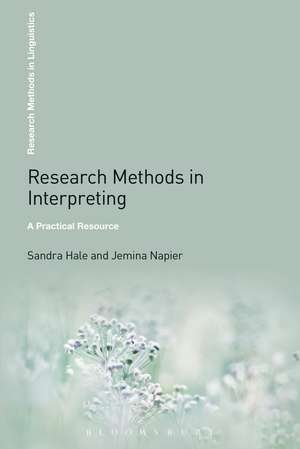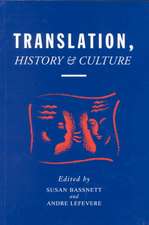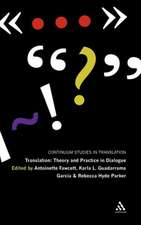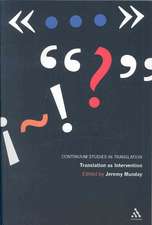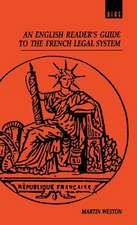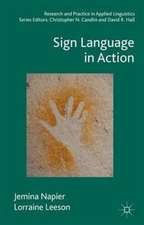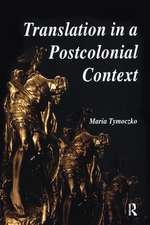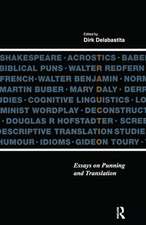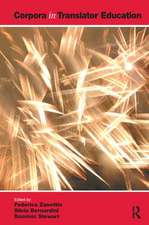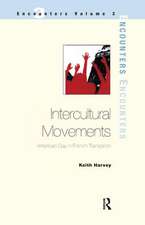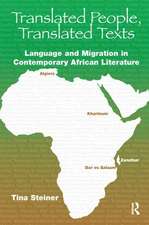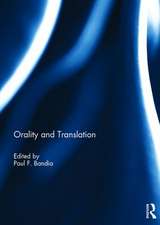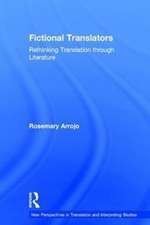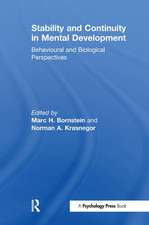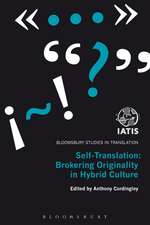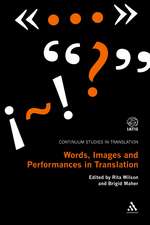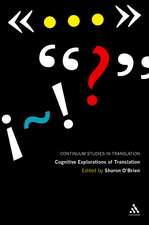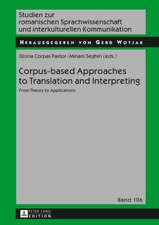Research Methods in Interpreting: A Practical Resource: Research Methods in Linguistics
Autor Sandra Hale, Dr Jemina Napieren Limba Engleză Paperback – 4 dec 2013
| Toate formatele și edițiile | Preț | Express |
|---|---|---|
| Paperback (1) | 219.84 lei 3-5 săpt. | +46.67 lei 7-13 zile |
| Bloomsbury Publishing – 4 dec 2013 | 219.84 lei 3-5 săpt. | +46.67 lei 7-13 zile |
| Hardback (1) | 891.51 lei 6-8 săpt. | |
| Bloomsbury Publishing – 4 dec 2013 | 891.51 lei 6-8 săpt. |
Preț: 219.84 lei
Preț vechi: 246.57 lei
-11% Nou
Puncte Express: 330
Preț estimativ în valută:
42.09€ • 43.31$ • 35.48£
42.09€ • 43.31$ • 35.48£
Carte disponibilă
Livrare economică 07-21 februarie
Livrare express 24-30 ianuarie pentru 56.66 lei
Preluare comenzi: 021 569.72.76
Specificații
ISBN-13: 9781441168511
ISBN-10: 1441168516
Pagini: 288
Dimensiuni: 156 x 234 x 15 mm
Greutate: 0.45 kg
Editura: Bloomsbury Publishing
Colecția Bloomsbury Academic
Seria Research Methods in Linguistics
Locul publicării:London, United Kingdom
ISBN-10: 1441168516
Pagini: 288
Dimensiuni: 156 x 234 x 15 mm
Greutate: 0.45 kg
Editura: Bloomsbury Publishing
Colecția Bloomsbury Academic
Seria Research Methods in Linguistics
Locul publicării:London, United Kingdom
Caracteristici
Offers a more detailed guide for interpreting researchers than previous general research methods books.
Notă biografică
Sandra Hale is Professor of Interpreting & Translation and Chair of the Research Committee at the School of International Studies at the University of New South Wales, Australia.Jemina Napier is Professor and Chair of Intercultural Communication at Heriot-Watt University, Scotland.
Cuprins
Chapter 1: What is research and why do we do it?Chapter 2: Critical reading and writingChapter 3: Questionnaires in Interpreting researchChapter 4: Ethnographic research on interpretingChapter 5: Discourse analysis in Interpreting researchChapter 6: Experimental methods in interpreting researchChapter 7: Research on interpreting education and assessmentChapter 8: Conducting and disseminating interpreting researchReferencesIndex
Recenzii
As a practitioner, researcher and educator in the field of interpreting for over two decades, I would recommend this book as an outstanding resource to anyone involved in interpreting or linguistics research.
This book is a blessing both for students making their first tentative steps into the world of research and also for more experienced academic staff who may be supervising dissertations and theses for the first time. It is a clearly written, step by step guide designed to demystify the often arcane field of linguistics research. Whilst aimed primarily at students and practitioners of Interpreting Studies, it could also be an excellent resource for students of other disciplines.
Hale and Napier's practical guide to research methods in interpreting provides a good and comprehensive overview of some of the more traditional and well-established empirical records in the field.
In a field so reliant on empirical studies using a range of methodological approaches, this timely book offers much-needed and eminently user-oriented guidance. Hale and Napier excel in combining a well-founded presentation of key concepts and techniques in empirical research with illustrative hands-on instruction. Rich in up-to-date sources and relevant examples, this volume is an invaluable asset to novice researchers and to the interpreting studies community at large.
This is a wonderful addition to the field of interpretation, offering structure and insight into the research methodologies that are available to researchers working with spoken and signed language interpreting. It also demystifies the research process by providing examples that are not only relevant, but that lead the reader to further sources of inspiration and knowledge. Napier and Hale have produced an excellent resource for emerging researchers, and our communities of practice will be the better for having this text.
Hale and Napier bring their expertise to co-author an outstanding pragmatic contribution to the Interpreting research field. The book provides insightful guidelines for Interpreting PhD candidates embarking on the research journey, as well as for Interpreting educators and students who could equally benefit from this articulate, insightful and methodically presented book.
[T]he first textbook which seeks to cover the needs of beginners, holistically and systematically.
This book is a blessing both for students making their first tentative steps into the world of research and also for more experienced academic staff who may be supervising dissertations and theses for the first time. It is a clearly written, step by step guide designed to demystify the often arcane field of linguistics research. Whilst aimed primarily at students and practitioners of Interpreting Studies, it could also be an excellent resource for students of other disciplines.
Hale and Napier's practical guide to research methods in interpreting provides a good and comprehensive overview of some of the more traditional and well-established empirical records in the field.
In a field so reliant on empirical studies using a range of methodological approaches, this timely book offers much-needed and eminently user-oriented guidance. Hale and Napier excel in combining a well-founded presentation of key concepts and techniques in empirical research with illustrative hands-on instruction. Rich in up-to-date sources and relevant examples, this volume is an invaluable asset to novice researchers and to the interpreting studies community at large.
This is a wonderful addition to the field of interpretation, offering structure and insight into the research methodologies that are available to researchers working with spoken and signed language interpreting. It also demystifies the research process by providing examples that are not only relevant, but that lead the reader to further sources of inspiration and knowledge. Napier and Hale have produced an excellent resource for emerging researchers, and our communities of practice will be the better for having this text.
Hale and Napier bring their expertise to co-author an outstanding pragmatic contribution to the Interpreting research field. The book provides insightful guidelines for Interpreting PhD candidates embarking on the research journey, as well as for Interpreting educators and students who could equally benefit from this articulate, insightful and methodically presented book.
[T]he first textbook which seeks to cover the needs of beginners, holistically and systematically.
Descriere
A groundbreaking guide to research methods in interpreting, full of questions and examples.
